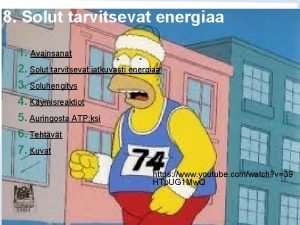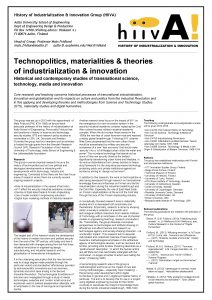History of Industrialization Innovation Group HIIVA Aalto University

- Slides: 1

History of Industrialization & Innovation Group (HIIVA) Aalto University School of Engineering Dept of Engineering Design & Production PO Box 14100 (Visiting adress: Otakaari 4 ) FI-00076 Aalto, Finland Head of Group: Professor Mats Fridlund mats. fridlund@aalto. fi aalto-fi. academia. edu/Mats. Fridlund Technopolitics, materialities & theories of industrialization & innovation Historical and contemporary studies of transnational science, technology, media and innovation Core research and teaching concerns historical processes of transnational industrialization, innovation and globalization and its impacts on culture and politics from the Industrial Revolution and in this applying and developing theories and methodologies from Science and Technology Studies (STS), materiality studies and digital humanities. The group was set up in 2013 with the appointment of Another research area focus on the impact of 9/11 on Mats Fridlund (Ph. D KTH 1999) as tenure-track the emergence of a new innovation system in the associate professor of the history of industralization at security-industrial-academic complex replacing the Cold Aalto School of Engineering. Previouslly, Fridlund has War nuclear-focused military-industrial-academic held positions in history of science and technology, complex. When the old nuclear threat waned in the security studies, STS and research policy studies at 1990 s the new fear of urban terrorism rose and reached universities in USA, UK, Denmark and Sweden. a widely global breakthrough. Following 9/11 urbanist Currently the group has four members and its activities Mike Davis prophesised that the new urtban threat is funded through grants from the Swedish Research would be exacerbated by military and security Council (VR), Research Foundation of the Helsinki /Users/matsfridlund/Dropbox/--db-PROFESSIONELLT/--PROFF-hiiva/ companies of a new “fear economy” that would make University of Technology, Aalto School of Engineering & ‘security’ into a “a full-fledged urban utility like water and the Letterstedtska foundation. power”. The mundane technology that stands out as iconic of this new security threat is the bollard. Research Significantly transforming urban forms and lifestyles, in The group’s overall empirical research focus is the its various instantiations from Jersey barriers to heavyhistory of technopolitics and on how political and duty flowerpots it is the ubiquitous pervasive technology ideological developments is interacting with protecting public and private institutions against car developments within technology, industry and bombs by aiming to “design out terrorism”. engineering. Connected to this there are five main focus areas of research where there are currently several In addition to this research, the work on technopolitics is ongoing research projects: also being developed through research on transnational knowledge flows and influences on Finnish and Nordic • Role of industrialization in the spread of terrorism industrialization during the industrial breakthrough and • 9/11 -effect the security-industrial-academic complex the Cold War. Especially the role of East-West trade • Decline of East-West trade & Finnish shipbuilding on Finnish industrialization at the end of the Cold War • Use of scale models in engineering education through the lens of the Finnish shipbuilding industry. • Digital topic modeling methods in historical research A conceptually focused research area is materiality studies which is developed both empirically and theoretically. Empirically, resaerch is done by studying Aalto University’s collection of scientific and technological artifact collections from Helsinki Institute of Technology with an emphasis on the use of physical models in engineering teaching, research and student life. Theoretically, the group develops conceptual perspectives on technologies and artifacts drawing on affordance and affect theories and research on technologies agency and society-shaping character – its unintended ‘impact’. This research aim to decenter The largest part of the research study the development individualist and collectivist histories of technologies of the history of modern terrorism and political security towards a methodological emphasis on the artifactual th from the end of the 19 century until today and how it agency of technological devices, such as revolvers and has interacted with changes arising from the first three bombs, providing what Andrew Pickering describes as a industrial revolutions in engineering design, ‘posthumanist’ description, “in which the human actors manufacturing, and industrial research and the are still there but now inextricably entangled with the globalization of transnational infrasystems. nonhuman, no longer at center of action and calling the shots. ” (Pickering 1995) It is the underlying assumption that the new terrorism was to a large degree made possible through the A last emerging research area of the group is particular violent and clandestine 'affordances provided methodological and focus on the impact of new text by technoscientific innovations such as revolvers, mining methodologies – especially ‘topic modeling’ – dynamite and anilin dyes arising in the Second that is being under development within digital Industrial Revolution. The technological foundations of humanities in general and in digital and spatial history in terrorism are investigated through a study of media particular. The aim is to develop this for use in a project technologies, expertise and ’civilian’ small arms and using digitized engineering journals for the Nordic explosives used in political assassination attempts, with countries to reevaluate the imapct of knowledge flows an emphasis on the role of hand-guns and dynamite during the Nordic industrial breakthrough, 1860 -1920. bombs. Teaching The following undergraduate and postgraduate courses will be given 2014 -2016: • Kon-0. 4730 The Cultural History of Technology • Kon-0. 4740 Science, Technology & Media of Terrorism • Kon-0. 4750 Industrializing Revolutions • Kon-0. 4997 Ofärdsårens politiska tekniker: Teknik, vetenskap och media, 1891 -1906 • Kon-0. 4998 Science, Technology, & Media in the Origin & Globalization of Modern Terrorism, 1866 -1914 Partners The group has established relationships with Finnish and international institutions: • VTT Innovation Studies Group, Finland • Brage Press Archive, Finland • Technical Museum of Finland • University of Helsinki, Finland • University of Turku, Finland • KTH Royal Institute of Technology, Sweden • University of Gothenburg, Sweden • Umeå University, Sweden • University of Copenhagen, Denmark • Roskilde University Center, Denmark • University of Manchester, UK • Brown University, USA • Massachusetts Institute of Technology, USA Relevant publications The following publications are related to the activities of the group: Brauer, R. & M. Fridlund, (2013) ”Historizing topic models”, in: LV Nikiforova & NV Nikiforova, eds. , Cultural Research in the Context of "Digital Humanities” Fridlund, M. , (2012) ”Affording terrorism” in: M. Taylor & P. M. Currie, eds. , Terrorism and Affordance. –––, (2011) “Bollards, buckets and bombs”, History and technology Fridlund, M. & G. Nelhans, (2011) ”Terrorens ingeniørkunstt”, in M. Fenger-Grøndahl, ed. , 11. september: . –––, (2011) , “Science and ‘The 9/11 -Effect’”, Science Progress. –––, (2011) “Naturvetare i kriget mot terrorismen”, Tvärsnitt. Matala, S. (2012) “Ida nkauppa oli varmaa, mutta sitten se loppui”, Historiallinen aikakauslehti Vähätalo, A. (2012) “Why academic heritage should not be restored and exhibited? ”, Tartu U likooli ajaloo ku simusi.

